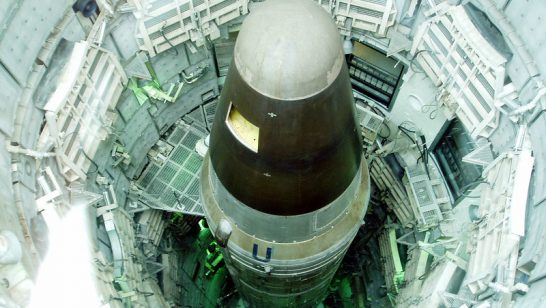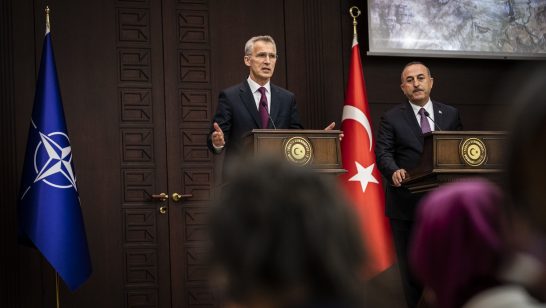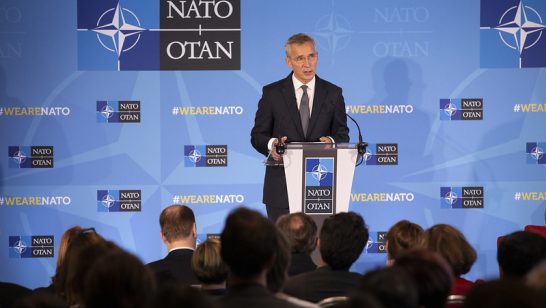
The NATO Summit on 14 June will be the first of the post-Trump “NATO is obsolete” era. The presence of President Biden with his longstanding commitment to the Atlantic Alliance means that the expectations of Allies are high. The optics for a successful summit are good. We can expect a transatlantic reconciliation at which NATO is declared more necessary and more valuable than ever. But what about the substance?
The recommendations of the Secretary General’s Reflection Group hint at what lies ahead. It envisaged a broadening and deepening of NATO’s agenda for a global, multipurpose Alliance – a far cry from the initial purpose in 1949 of collective defence of the North Atlantic. Will this ambitious vision get the stamp of approval of the 30 Alliance leaders? This question will be tested at the June Summit.
Various statements by the Secretary General have made it clear that the consequences of the Summit will be at once immediate and longer-term. The immediate impact will be strongly political and declaratory. It will agree a substantial statement in which, for example, an increased focus on the risk that China poses to the international rules-based order will be prominent. Other issues will include strengthening defence and deterrence against Russia and terrorism. The allies will pledge to boost their individual and collective resilience against hybrid and cyber threats. NATO’s contribution to combatting climate change will also be given greater visibility.
For the longer term, beyond the rhetoric of the Statement, the Summit will task the Secretary General to update NATO’s Strategic Concept, last revised in 2010.
The updated Strategic Concept will reflect the decisions and policy positions agreed by the Summit. The drafting will be undertaken by NATO’s international staff, closely supervised by allies in the form of their representatives on the North Atlantic Council, NATO’s decision-making body. The objective will be to have a transformed Alliance by 2030 that responds to the changes and challenges of the contemporary security environment as agreed by the leaders.
In discussions of NATO, the significance and difficulties of the consensus process as the basis for Alliance decision making is frequently overlooked. Likewise, the essential distinction between the Alliance as a group of 30 individual members and NATO as the organisation that enables their cooperation and collective agreement, is also misunderstood. The distinction is important. The NATO machinery facilitates the taking of collective Alliance decisions. It does not, however, determine them: that prerogative lies with the nations. Their collective agreement resulting from consensus constitutes a single NATO voice, albeit with sovereignty guarded.
The Ambassadors – the NATO Council in permanent session – will become the centrepiece in the search for agreement on the content and language of an updated concept. Achieving consensus will involve the inevitable concession and compromise, as nations adjust their positions and balance national against collective interests.
Even if every effort is made to demonstrate Alliance unity and demonstrate consensus among the leaders at the June Summit, inevitably there will be differences of interpretation and emphasis on numerous key issues, especially on China and Russia. Disagreements will be papered over by ambiguous wording in the Summit statement but will be exposed in the negotiations over the subsequent Strategic Concept. The drafting of the Strategic Concept will have to resolve such differences or else live uneasily with them.
In the interconnected world of security, there is an inevitable tendency to assume that most security-related issues are relevant in some degree to the Alliance. Whatever the cause, reasons will be invoked to involve the Alliance. Moreover, NATO’s organisational machinery provides an easily accessible vehicle for consultation, cooperation and exchange of information. However, making NATO the forum for consultation on all security related issues – in effect the institutional security supremo – risks stretching its organisational effectiveness and straining its ability to reach consensus to the limit – thereby distracting from those areas where NATO enjoys unquestioned competence, for example in military matters, and ignoring the more immediate relevance of other institutions, such as the EU or OSCE.
Some differences are not easily resolvable. The newer allies in central and eastern Europe want to use this opportunity to rebalance, others would say “unbalance”, the relationship with Russia by watering down NATO’s current policy of pursuing opportunities for dialogue. Another example is the criticism that some allies, also EU members, level against Turkey for its alleged breaches of international law in the Eastern Mediterranean. Turkey in response resists closer NATO-EU cooperation, a longstanding policy objective of both organisations. The Secretary General is calling for a substantial increase in NATO’s commonly funded budgets “to help fund more joint training and exercises”. This will meet considerable resistance, especially as COVID will mean a tightening of national budgets.
Another potentially controversial element concerns NATO’s nuclear and related arms control policies. These were given relatively low visibility in the recommendations of the Reflection Group. However, the updated Strategic Concept might have to revisit NATO’s nuclear policy if Biden’s campaign-trail comments about nuclear “sole purpose” translate into a real shift in US doctrine when his administration carries out its forthcoming nuclear posture review.
How far are the newer challenges able to command consensus? For some issues, NATO may not be the first port of call or may not have much to contribute. Its involvement will often require cooperation with other organisations – the European Union being the most obvious associate in many instances.
Two widely quoted examples, both discussed by the Reflection Group as candidates for updating – climate change (a prominent idea in a report by young leaders from a broad spectrum of NATO countries) and China – illustrate the importance of considering the consequences of changes or additions to the 2010 Concept.
The 2010 concept makes only a passing reference to climate change. In view of the almost universal recognition of the gravity of the threat, few would argue against raising the visibility of climate change in NATO’s concept. All allies are committed to the Paris climate change agenda. But what value added would NATO bring to targets which should already be reflected in national plans, under the Paris agreements? At the very most, a pledge to reduce carbon emissions from NATO exercises and national military activities, as contribution to net-zero, with minimal organisational change or effort, or even overall effect.
Regarding China, at their meeting in London in December 2019, NATO leaders declared that China presented simply “opportunities and challenges”, reflecting a balance of views among the allies at the time. This June Summit is expected to make a tougher reference to China prominent among the key changes in NATO policy. But how tough?
Probably, the most that allies will accept will be to strengthen their resilience to cyber and other security risks. To go further will mean accommodating the divergent views within the Alliance on how to manage relations with the rising super-power. Individual or groups of allies may want to show their Western flags in the South China Sea, particularly in support of NATO partners Japan and Australia, but it is unlikely to be a NATO flag. Global discussions, yes; global responsibilities for NATO, no.
So, global NATO – reality or rhetoric? For an Alliance based on consensus, inevitably a bit of both. NATO leaders will acquiesce in accepting proposals giving the Alliance a global outlook in terms of consultations on security issues. However, it is doubtful that this will lead to broader military responsibilities than those involved in Euro-Atlantic defence and security. Allies will support a more “political” profile for NATO but will not want this to dilute the organisation’s core function of collective, and above all, regional defence.
The opinions articulated above represent the views of the author(s), and do not necessarily reflect the position of the European Leadership Network or any of its members. The ELN’s aim is to encourage debates that will help develop Europe’s capacity to address the pressing foreign, defence, and security policy challenges of our time.
Image: Flickr, NATO North Atlantic Treaty Organization




